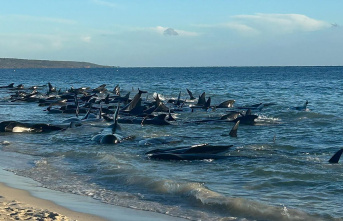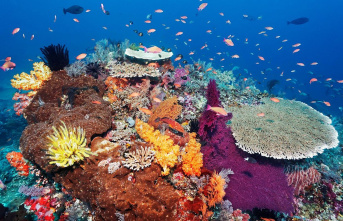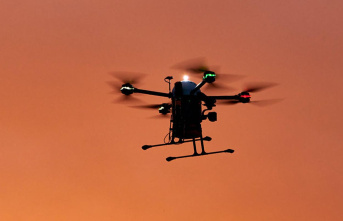NUSA DUA (Indonesia) -- On Friday, top diplomats representing the most powerful and wealthy nations in the world struggled to reach a common ground over Russia's war against Ukraine and how to address its global consequences.
Talks that had been in balance were thrown off balance by two unexpected and unrelated political developments far from Bali, Indonesia where they were meeting. Group of 20 foreign ministers heard from their Indonesian host an emotional plea for unity as well as an end to the conflict.
Despite deepening East-West divisions caused by China and Russia, the United States and Europe, consensus seemed to be difficult. All the major players were present, marking the first time that U.S. Secretary Antony Blinken (Russian Foreign Minister Sergey Lavrov) have been in the same place since Russia invaded Ukraine.
According to a west diplomat present, Lavrov left the proceedings at least twice. Once when Annalena Baerbock, his German counterpart, spoke at the opening session. And again shortly before Dmytro Kuleba, the Ukrainian Foreign Minister, was to speak via video at the second session.
The meeting was only hours after Boris Johnson, the British Prime Minister, announced his resignation on Thursday. Liz Truss, his Foreign Secretary, was also forced to leave. It was just beginning when Shinzo Abe, the former Japanese Prime Minister, was shot.
Johnson and Abe are both well-known to the G-20 family having attended numerous similar conferences and leaders’ summits. Friday's meeting had one goal: to prepare for the November G-20 summit Indonesia will host.
Many of the participants were shocked by Abe's shooting as they held the first of two plenary sessions about the importance of restoring confidence and maintaining the global rules-based order.
Retno Marsudi, Indonesia's Foreign Minister, urged the group, which included Wang Yi, Lavrov and many European counterparts, to overcome mistrust to save the planet facing multiple challenges, including climate change, coronavirus, and the threat of the virus.
Marsudi stated that while the world is still recovering from the pandemic, it is already facing another crisis: the conflict in Ukraine. "The ripple effects of the pandemic are being felt worldwide on food, energy and physical space."
She pointed out that developing and poor countries are now facing the brunt of fuel shortages and grain shortages as a result of the war in Ukraine. She said that the G-20 had a responsibility for addressing the issue to keep the rules-based global order relevant.
She said that the Ukraine war had shaken this order as Lavrov seemed to be shuffle paper without expression at his place between the foreign ministers from Saudi Arabia and Mexico.
Marsudi stated, "Honestly, it is difficult for the whole world to sit together." She continued, "The world is watching us so we can't fail."
They sat at the same conference table for the opening but neither Lavrov or Blinken expressed any interest in one another and they had no plans of meeting.
After the first session, Lavrov stated to reporters that it wasn't us who had abandoned all contact. It was the United States. That's all I have to say. We aren't going after anyone suggesting meetings. They can choose not to speak if they so desire.
According to a western diplomat, Blinken immediately attacked the Russian delegation. He accused Moscow of blocking millions of tonnes of grain from Ukrainian ports, causing food insecurity worldwide, and so on.
Lavrov wasn't there to make the comments. His replacement, Russia's diplomat, began Russia’s intervention by telling the group that she didn't have prepared remarks. The diplomat spoke under anonymity to describe the closed door meeting.
Blinken also praised Marsudi's speech at a separate meeting. He told her that the COVID effects are still visible around the globe, and that the Russian aggression against Ukraine is making it even more difficult.
Marsudi's appeal was not enough to make it possible for the gathering to reach the high-minded consensuses that were so common in past gatherings.
Officials from the United States say that they will not allow distractions to distract attention from the main focus of the Bali conference. They blame Moscow for the disruption in world food and energy supplies caused in part by Russia's war on Ukraine and are preparing a response to stop the shortages that have already been causing havoc in Africa and Asia.
The potential for a G-20 deal on a way forward seemed negligible with East and West divided and North-South divergences emerging. Officials from the United States suggested that there would not be a group communique on key issues such as terrorism, climate change, and transnational crime.
Officials from the United States said that it was less important for G-20 to take a united stance as an entity than for smaller groups of countries to speak out and act.
There has been intense competition among the sides for support. Wang and Lavrov stopped in different Asian capitals while on their way to Bali. They drummed up support for various Russian and Chinese positions, and strengthened their ties with non-allied countries.
Blinken, the French and Germans, as well as the Brits, arrived in Bali last week from two Western-oriented, organized gatherings in Europe: the G-7 summits and NATO summits. There was little tension or debate, and unity was achieved on Ukraine.
The G-20 has a wider membership that includes countries such as Indonesia, host country, and large developing nations such as South Africa, Brazil, and India. This makes it more diverse and skeptical of Western intentions. It is also more open to offers and entreaties from big neighbours like Russia and China, and therefore more vulnerable to their threats.
In an effort to find a middle road, Indonesia's G-20 president this year has attempted to bridge any gaps, setting out a plan that isn't inherently divisive and political. While Indonesia has tried to be neutral when dealing with Russia's invasion, President Joko Widodo has kept his words tame.
As is so often the case with large participants, the last message will be controlled by the largest players. China, Russia, and the U.S. are fighting for supremacy.












